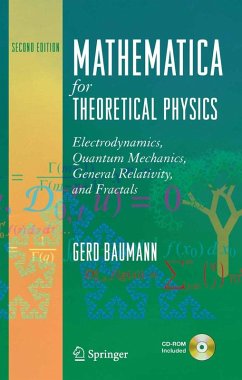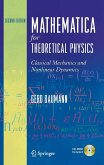Mathematica for Theoretical Physics: Electrodynamics, Quantum Mechanics, General Relativity, and Fractals This second edition of Baumann's Mathematica® in Theoretical Physics shows readers how to solve physical problems and deal with their underlying theoretical concepts while using Mathematica® to derive numeric and symbolic solutions. Each example and calculation can be evaluated by the reader, and the reader can change the example calculations and adopt the given code to related or similar problems. The second edition has been completely revised and expanded into two volumes: The first volume covers classical mechanics and nonlinear dynamics. Both topics are the basis of a regular mechanics course. The second volume covers electrodynamics, quantum mechanics, relativity, and fractals and fractional calculus. New examples have been added and the representation has been reworked to provide a more interactive problem-solving presentation. This book can be used as a textbook or as a reference work, by students and researchers alike. A brief glossary of terms and functions is contained in the appendices. The examples given in the text can also be interactively used and changed for the reader's purposes. The Author, Gerd Baumann, is affiliated with the Mathematical Physics Division of the University of Ulm, Germany, where he is professor. He is the author of Symmetry Analysis of Differential Equations with Mathematica®. Dr. Baumann has given numerous invited talks at universities and industry alike. He regularly hosts seminars and lectures on symbolic computing at the University of Ulm and at TECHNISCHE UNIVERSITÄT MÜNCHEN (TUM), Munich.
Dieser Download kann aus rechtlichen Gründen nur mit Rechnungsadresse in A, B, BG, CY, CZ, D, DK, EW, E, FIN, F, GR, HR, H, IRL, I, LT, L, LR, M, NL, PL, P, R, S, SLO, SK ausgeliefert werden.
From the reviews of the second edition:
"The new edition contains a lot of additional material and new examples, and more emphasis is put on an interactive problem solving. In particular, advantage is taken of many special functions and frequently used operations which are available in Mathematica, in order to demonstrate how Mathematica can be used to replace lengthy 'by-hand' calculations and to give graphical support." (M. Plum, Zentralblatt MATH, Vol. 1095 (21), 2006)
"The new edition contains a lot of additional material and new examples, and more emphasis is put on an interactive problem solving. In particular, advantage is taken of many special functions and frequently used operations which are available in Mathematica, in order to demonstrate how Mathematica can be used to replace lengthy 'by-hand' calculations and to give graphical support." (M. Plum, Zentralblatt MATH, Vol. 1095 (21), 2006)









